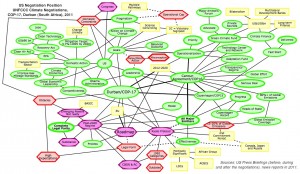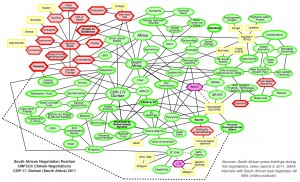Research Groups and Tools
The Waterloo Institute for Complexity and Innovation is currently pursuing six distinct research programs, each supported by an active group of researchers that meet regularly:
- Alternatives to Conventional Growth
- Cognitive-Affective Modeling; Dimensions of Ideology
- Coupled Human-Environment Systems Theory
- Robustness of Complex Networks:Reaching Agreement Despite Stubborn and Malicious Adversaries
- Open-Architecture Problem Solving
- Comparative Threshold Behavior in Physical, Ecological, and Social Systems
- Vulnerabilities in Human-Environment systems: Tools for complex system analysis (Urban environments)
Alternatives to Conventional Growth
This group is investigating the technical, social, and ethical implications of various pathways of change towards economic systems with radically reduced material and energy throughput. In this context, it is specifically investigating the relationship between energy input and societal complexity.
Cognitive-Affective Modeling; Dimensions of Ideology
This research group is pursuing: 1. the development of a methodology—Cognitive-Affective Mapping—for representing graphically the content of beliefs, including their emotional valence; and 2. a description of the dimensions describing the state space of contemporary political and economic ideologies, along with an account of mechanisms of change within that state space.
Coupled Human-Environment Systems Theory
The future health of both human populations and natural systems depends on the two-way interaction between human systems and our environment: what humans do influences the environment, but the resulting changes in the environment in turn influence our perceptions and behaviour. Humans and their environment together thus form a single, coupled nonlinear system. A particular focus of this group’s research into coupled systems is the development of models of human-environment interactions in forest-grassland mosaic ecosystems, and human-disease interactions in the context of vaccines. The group applies empirically motivated theoretical modelling to tackle problems of policy or fundamental scientific interest.
Robustness of Complex Networks:Reaching Agreement Despite Stubborn and Malicious Adversaries
This research program studies the structure and dynamics of complex networks (including social, economic, biological, ecological and engineered networks). The goal of the program is to develop mathematical models for complex networks, identify fundamental metrics and universal properties that characterize the efficacy and resilience of networks, and propose mechanisms to leverage the structure and dynamics to improve the functioning of the overall system.
Open-Architecture Problem Solving
This research program seeks to identify processes for enabling collective problem solving in response to critical global challenges. Of particular interest are applications of open-source methods to large-scale collaborative problem solving—especially methods that might improve democratic practice.
Comparative Threshold Behavior in Physical, Ecological, and Social Systems
The research program explores similarities and differences between theories explaining sharply nonlinear or “threshold” behavior in physical, ecological, and social systems. It applies this knowledge to better explain sudden shifts in behavior of social systems.
Vulnerabilities in Human-Environment systems: Tools for complex system analysis (Urban environments)
Professor Dawn Parker is currently leading a research team to develop agent-based residential land use and transportation models that explore linkages between socioeconomic and cultural characteristics of residents; their choices in housing markets, daily transport decisions, and environmental management of their properties; the goals and behaviour of developers; the constraints placed on both groups by policy makers and planners; and the macro-scale emergent patterns of urban form and transit network function that result.
Research Tools
These tools are produced by WICI Core and Affiliate Researchers to provide deeper insight into complex phenomena.
This software program is designed to help people understand and resolve conflicts. The two example CAMs, below, are part of a conference paper by Manjana Milkoreit, PhD Candidate in Global Governance at the University of Waterloo, entitled The Role of Cognition in Global Climate Politics – Mapping Belief Systems and Emotions across the North-South Divide, presented at Planet under Pressure 2012 (London).



